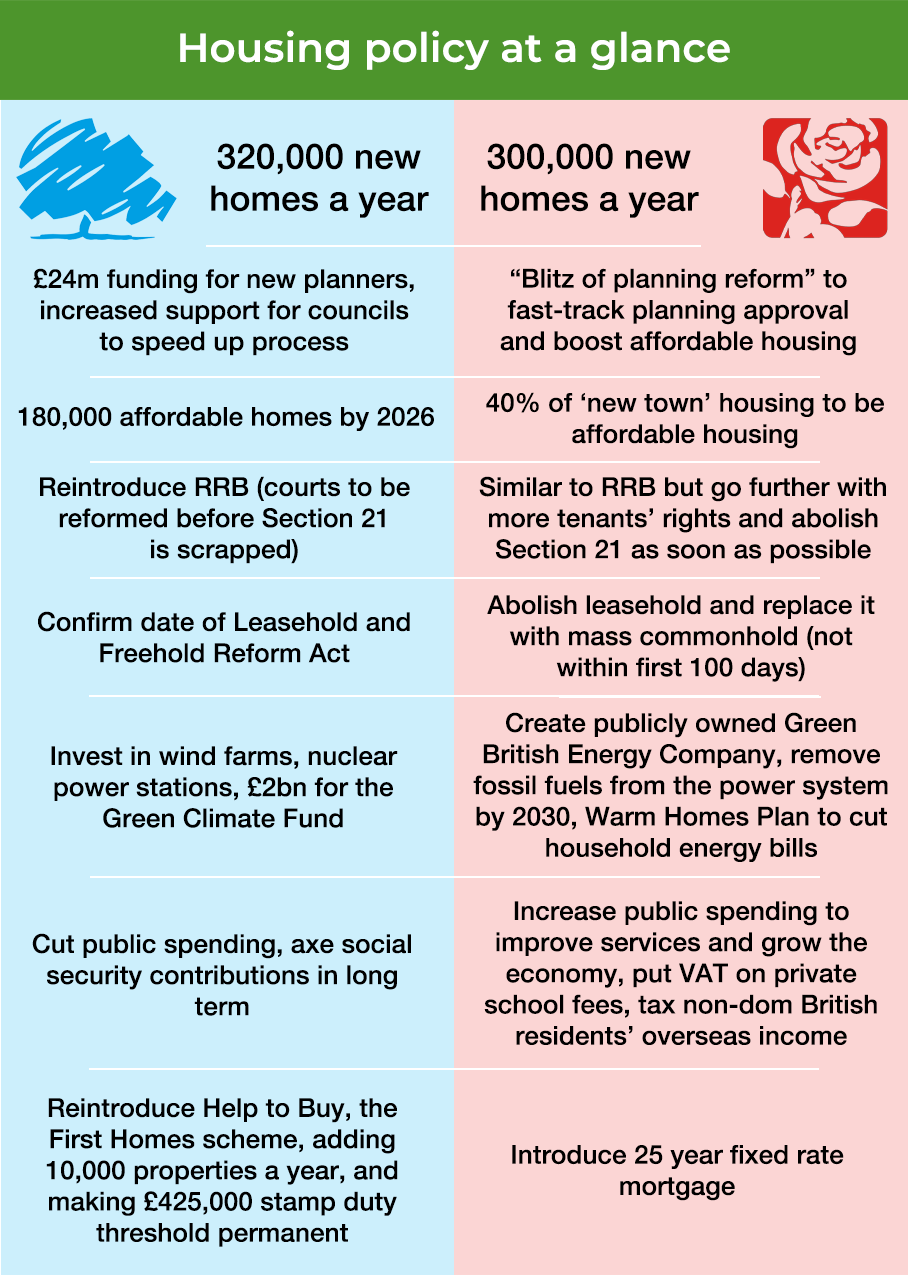
With the manifestos now out, we’ve put together what we know about the main parties’ policies around 8 key areas that could affect landlords, buyers, sellers and tenants.
Of course, there may be some additions leading up to July 4th, but we don’t expect any of the pledges we’ve outlined to disappear.
Housebuilding: new homes targets
Back in 2019, the Conservatives promised that 300,000 new homes would be built in England every year by 2025.
Then, in 2022, they dropped this target down to ‘advisory’, and data shows that there were fewer than 250,000 built in the whole of England, Scotland and Wales in 2023.
The Construction Products Association has predicted that by next year there will be a 40% shortfall in what the Conservatives promised to deliver. So, boosting the supply of new homes is something the next government urgently needs to address.
Currently the Conservatives have committed to 1.6 million homes (320,000 per year), driving home ownership and developing new builds on brownfield sites while protecting the existing Greenbelt.
Meanwhile, Labour has pledged to deliver 1.5m new homes by the end of its first five-year term – keeping that same 300,000 target in place.
And where the Tories are focusing on brownfield sites, Labour have said they’ll push for development of ‘grey belt’ land – things like disused car parks or wasteland, rather than green fields. The party has also committed to building the next generation of ‘new towns’: “New communities with beautiful homes, green spaces, reliable transport links and bustling high streets.”
The Liberal Democrats pledge to build 380,000 of which 150,000 would be social homes – each year. These homes would be delivered by expanding Neighbourhood Planning across England, building ten new garden cities and “allowing councils to buy land for housing based on current use value rather than on a hope-value basis by reforming the Land Compensation Act 1961.”
Planning reforms
Whoever comes to power, an overhaul of the planning system is much needed. Official government figures for Q4 2023 show:
- Only 39% of minor planning applications in England were decided within the statutory time period of 8 weeks
- Only 20% of major applications were decided within the statutory period of 13 weeks.
Last summer, the Government held a consultation outlining their proposals for overhauling the planning system. They promised, “nation-wide reforms…including £24 million for hundreds of new planners to tackle the planning backlog” and stated: “Measures in the consultation launched today will mean faster consenting, more effective consultation and more resources. Alongside this we have announced additional support for councils to help them speed up the delivery of vital infrastructure.”
The Conservatives are saying they will give local councils powers to curb holiday lets. They also plan to fast track planning and to build on brownfield sites, while they intend to protect the existing Greenbelt.
Labour has promised to:
- Give more power to local communities over how housing can be built in their area
- Work with local authorities to ensure plans are quickly drawn up and agreed
- Deliver, “a blitz of planning reform to quickly boost housebuilding to buy and rent and deliver the biggest boost to affordable housing in a generation… with fast-track approval and delivery of high-density housing on urban brownfield sites”.
The Lib Dems are focused on delivering more homes at a fairer price and encouraging greater community engagement in the planning process and development of brownfield sites. They’re also pledging to introduce a ‘use-it-or-lose-it’ policy for developers if they don’t develop land that’s been given full planning permission.
Although that might sound very fair, it’s not actually something developers tend to do! They only make money once properties are finished and sold, so it simply doesn’t make sense for them not to build on land that’s been given planning approval.
Increasing the supply of affordable housing
Building more affordable homes for rent as well as purchase has to be a real priority for the next government. Government figures show that at the end of 2023 there were more than 112,000 households in temporary accommodation in England alone - an increase of 12% on December 2022.
And because there are so many Local Housing Association (LHA) tenants who are eligible for social housing currently renting in the Private Rented Sector (PRS), that’s made the overall shortage of private rented housing even worse.
The Conservatives have done well with their 5-year £11.5bn Affordable Homes Programme, which they launched in 2021. They promised to deliver up to 180,000 new homes, with 50% of those available at a discounted rent, including affordable and social rent.
By the end of March 2023, a total of 41,850 affordable rent homes and 16,808 social rent homes had been built and their intention is for this Programme to continue.
Build to Rent, which the Tories launched with a £1bn funding pledge in 2013, has also been a success:
- By Q1 2024, 208 local authorities had Build to Rent units in their pipeline
- Over the previous 12 months, the total sector pipeline grew by 4%
- The B2R pipeline currently stands at more than 265,000 units.
Labour plans for 40% of all ‘new town’ housing to be affordable and has pledged to make sure private developers take on their responsibilities to contribute to affordable homes. They are also going to review the Right to Buy.
And the Lib Dems have said 150,000 new homes out of their 380,000 annual target would be social housing.
Help for first time buyers (FTBs)
The Conservatives’ Help to Buy equity loan scheme, which ran from 2013 to 2023, gave FTBs an interest-free loan to supplement their deposit. Over 10 years, the scheme helped FTBs buy around 330,000 properties.
The Tories are now doing three key things to help FTBs afford homes:
- Introduce an updated version of Help to Buy
- The First Homes scheme is already up and running. This allows eligible FTBs to buy a home for 30%-50% less than its market value. Although the scheme isn’t yet widespread in England, the Government has pledged to add 10,000 properties every year, which should make it easier for FTBs to find a property in their area.
- In their election manifesto, they have announced that the temporary extension of the nil-rate stamp duty threshold for FTBs – which was raised from £300,000 to £425,000 in the September 2022 mini-budget - will be made permanent.
The mortgage guarantee scheme that supports 95% mortgages is set to end in mid-2025 and it is expected that this will be continued.
One Labour pledge that would be helpful to those trying to get on the housing ladder is the introduction of a 25-year fixed-rate mortgage called Freedom to Buy. With such a long loan term, there shouldn’t be such pressure for lenders to stress-test customers, and the interest rates would be competitive.
First-time buyers will also be given the first option of buying homes on new developments, before being offered to international investors.
Scrapping Section 21 and other rental reforms
The Renters (Reform) Bill (RRB) had got all the way to the 2nd reading stage in the House of Lords before Parliament was dissolved and it had to be abandoned.
If the Conservatives were to win the election, they’d undoubtedly resurrect the Bill and aim to progress it quickly. With s21, it’s important to remember that they have clearly stated this wouldn’t be scrapped until the court system had been properly reviewed to make sure it could deal effectively with the additional expected workload.
A Labour government would replace the RRB with their ‘renters' charter’. This has many similar aims but goes a bit further with protecting tenants’ rights. It currently includes:
- Abolishing Section 21 evictions (although this is highly unlikely to happen immediately, despite Angela Raynor announcing last November that Labour would “ban ‘no-fault’ evictions with no caveats on its first day in power”)
- Extending ‘Awaab’s Law’ to the private sector
- Preventing discrimination by landlords, we believe this refers to tenants who are in receipt of benefits or have children
- Allowing tenants to make reasonable changes to their rented homes
- Scrapping rent review clauses in tenancy agreements and only allowing annual increases
It will also “seek to close loopholes that disreputable landlords might use to exploit tenants and jeopardise their security of tenure following the abolition of Section 21”.
And the Lib Dems have said they “will keep fighting for a fair deal for renters who have been disastrously let down by this Conservative Government.” Their manifesto includes pledges to introduce default 3-year tenancies, ban no-fault evictions and introduce a national register of licenced landlords.
Leasehold reform
The current government has made some good progress on leasehold reform, with the passing of two Acts:
- The Leasehold Reform (Ground Rent) Act 2022 – this has restricted ground rents on new leases and extensions to existing leases to a ‘peppercorn’ (zero) rent
- The Leasehold and Freehold Reform Act 2024 (date for this coming into force has yet to be decided) will mean:
- It will be easier and cheaper for leaseholders to buy their freehold
- Standard lease extension terms will be increased from 99 to 990 years
- Leaseholders will have greater transparency over service charges
- It will be easier for leaseholders to challenge landlords’ unreasonable charges at Tribunal
- The sale of new leasehold houses will be been banned (other than in exceptional circumstances)
One big thing outstanding is the Conservatives’ promise to remove or cap ground rent for existing leaseholders.
If Labour comes to power, the party has pledged to get rid of the leasehold system and replace it with mass commonhold. However, they did say in April that this wouldn’t be done within the first 100 days of government, as more time is needed to enact such a ‘radical’ measure.
Net zero
All parties are committed to achieving Net Zero carbon emissions by 2050, but there are clear differences between them in terms of how quickly they plan to transition to green energy.
Last September, Rishi Sunak announced the Conservatives were scrapping or pushing back various targets, including:
- The ban on new gas boilers in existing homes by 2025
- The introduction of a minimum C rating on an EPC for new tenancies from 2028
He said they were delaying these changes because of the financial implications for people who are already struggling with the cost of living: “It cannot be right for Westminster.…to interfere so much in people’s way of life without a properly informed national debate.”
Nevertheless, the party has pledged:
- Continued investment in offshore wind farms, with the ban on onshore wind lifted
- To support the building of new nuclear power stations, which has not been done in the UK for 30 years
- A £2 billion financial injection for their Green Climate Fund
In contrast, Labour has doubled down on its commitment to Net Zero. It plans to:
- Move away from using fossil fuels in the power system by 2030 – five years earlier than the Conservatives’ original target
- Create Great British Energy (GBE), a publicly owned clean generation company, which will harness green power to deliver energy security for the UK and cut energy bills
- Introduce a Warm Homes Plan to cut household bills by up to £500 a year, by installing energy-saving measures
- Give local councils the power and funding to upgrade homes in their area
The Lib Dems are pledging to cut greenhouse gas emissions to net zero by 2045 and make significant investment in renewable power so it generates 80% of the UK’s electricity by 2030.
They would also introduce a social energy tariff for those who can least afford their bills and improve energy efficiency standards through a drive on insulation.
And the Green Party has said the Tories’ £2bn Green Climate Fund is nowhere near enough. They would spend £145 billion over 10 years to facilitate the retrofitting of homes with insulation and say they would also have much stronger energy efficiency regulation and enforcement for the PRS.
Public spending and tax changes
Although public spending tends to boost the economy, it needs to be kept under control, otherwise inflation rises too quickly.
When that happens, then the Bank of England will usually raise interest rates in order to bring inflation back down again. And although investment in public services is broadly popular, the government needs to make sure it’s affordable.
The big question is: where does the government find the money to spend on the public sector? It can only come from taxes and/or borrowing, so when investment is needed, there are three choices: reallocate current funding, raise taxes or increase UK debt.
The UK tax burden is currently at its highest since the second world war, and all parties know any tax rises would be hugely unpopular.
The Conservatives are being very financially cautious. Rishi Sunak is trying to appeal to voters by saying he eventually wants to axe all social security contributions for workers, and the Chancellor says he plans to make public spending cuts.
But Labour, which is traditionally the party of increasing public spending, says these cuts are unfeasible. It is promising to improve public services and end under-investment in things like infrastructure that are vital for economic growth.
The party plans to help finance this by raising taxes for the highest earners - charging VAT on private school fees and taxing the overseas income of non-domiciled British residents.

As a landlord, what should you do now?
Given that there aren’t that many differences between the Conservative and Labour housing policies, this election is unlikely to have much effect on the property market.
Both parties intend to:
- Build around 300,000 new homes a year with a focus on affordable housing
- Streamline the planning process, and
- Introduce similar rental reforms
The main thing that could have an impact is if Labour come to power and make economic changes that cause inflation to rise again - such as a big injection of public spending.
If that did happen, the Bank of England could hold the base rate where it is or even raise it, and either of those moves could mean higher mortgage interest rates for borrowers across the board. That could result in the market stagnating and prices then falling, as those who need to sell compete for buyers.
However, this scenario isn’t something that’s predicted by most forecasters. What’s most likely is that the Monetary Policy Committee will start to bring the base rate down, possibly as early as August, which will encourage mortgage lenders to follow suit – good news if you’ve got a buy-to-let mortgage or are planning to make a new investment.
And because of the continuing shortage of housing for both sale and rent, we’re expecting the market to follow its usual cycle for the rest of the year. That’s a relatively quiet summer, followed by renewed interest in moving in the autumn.
We might also see a post-election ‘bounceback’ of activity, which can happen once a new government and its policies have had a chance to settle.
So, if you’re currently looking at making a new investment and you find a good deal, there’s really no reason not to move forward with it.
As always, the most important thing is that you ‘stress test’ your planned investment against things like interest rates rising and legal compliance costs increasing, before committing to buy.
If there are any early policy changes that affect lettings legislation, these will take some time to come into effect, so there’s nothing to be concerned about in the immediate future.
Four thing we recommend you keep your eye on:
- Make sure you understand the potential implications of scrapping Section 21. We don’t anticipate it causing a real issue from an eviction perspective for good landlords, but do come and speak to us if you have any questions or concerns.
- Labour’s policies around Net Zero could potentially have a knock-on effect on your investment, so make sure you understand those.
- It’s likely that landlords will have to comply with a minimum EPC rating of C within the next few years.
- Any tax changes that impact your personal or business taxation could affect your Buy to Let profits and overall earnings, so it’s worth consulting a tax specialist post-election.
Of course, every area is different in terms of prices, trends, supply and demand. So, if you’re thinking of investing or are currently letting property, do get in touch with your local branch. Our experts will be very happy to help you understand the local market and discuss what effect, if any, the election outcome might have on it.
Are you letting your rental property for the best price possible? To maximise your yield simply book a free rental valuation today.
The Your Move Content Marketing Team



